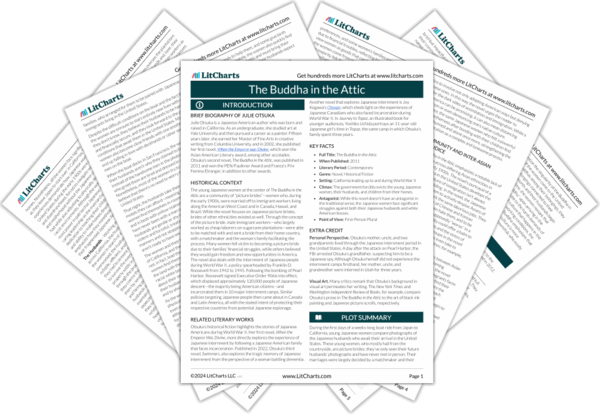The White Townsfolk Quotes in The Buddha in the Attic
They did not want us as neighbors in their valleys. They did not want us as friends. We lived in unsightly shacks and could not speak plain English. We cared only about money. Our farming methods were poor. We used too much water […] We were taking over their cauliflower industry. We had taken over their spinach industry. We had a monopoly on their strawberry industry and had cornered their market on beans. We were an unbeatable, unstoppable economic machine[.]
A few of us began receiving anonymous letters in the mail, informing us that our husbands would be next […] Others reported that their husbands had been threatened by angry Filipino workers in the fields […] Hitomi, who had worked as a housekeeper at the Prince estate for more than ten years, was held up at gunpoint in broad daylight as she was heading back into town.
They pulled on their overalls in the countryside and helped us prepare for the harvest one last time, for we had been ordered to till our fields until the very end. This was our contribution to the war effort, we were told. An opportunity for us to prove our loyalty. A way to provide fresh fruits and vegetables for the folks on the home front.
Most of us left speaking only English, so as not to anger the crowds that had gathered to watch us go. Many of us had lost everything and left saying nothing at all. All of us left wearing white numbered identification tags tied to our collars and lapels.
A woman who used to rent to the Nakamuras says they were the best tenants she’s ever had. “Friendly. Polite. And so clean, you could practically eat off their floors.” “And they lived American, too,” says her husband. “Not a Japanese touch anywhere. Not even a vase.”
Harada Grocery has been taken over by a Chinese man named Wong but otherwise looks exactly the same, and whenever we walk past his window it is easy to imagine that everything is as it was before. But Mr. Harada is no longer with us, and the rest of the Japanese are gone. We speak of them rarely now.

The White Townsfolk Quotes in The Buddha in the Attic
They did not want us as neighbors in their valleys. They did not want us as friends. We lived in unsightly shacks and could not speak plain English. We cared only about money. Our farming methods were poor. We used too much water […] We were taking over their cauliflower industry. We had taken over their spinach industry. We had a monopoly on their strawberry industry and had cornered their market on beans. We were an unbeatable, unstoppable economic machine[.]
A few of us began receiving anonymous letters in the mail, informing us that our husbands would be next […] Others reported that their husbands had been threatened by angry Filipino workers in the fields […] Hitomi, who had worked as a housekeeper at the Prince estate for more than ten years, was held up at gunpoint in broad daylight as she was heading back into town.
They pulled on their overalls in the countryside and helped us prepare for the harvest one last time, for we had been ordered to till our fields until the very end. This was our contribution to the war effort, we were told. An opportunity for us to prove our loyalty. A way to provide fresh fruits and vegetables for the folks on the home front.
Most of us left speaking only English, so as not to anger the crowds that had gathered to watch us go. Many of us had lost everything and left saying nothing at all. All of us left wearing white numbered identification tags tied to our collars and lapels.
A woman who used to rent to the Nakamuras says they were the best tenants she’s ever had. “Friendly. Polite. And so clean, you could practically eat off their floors.” “And they lived American, too,” says her husband. “Not a Japanese touch anywhere. Not even a vase.”
Harada Grocery has been taken over by a Chinese man named Wong but otherwise looks exactly the same, and whenever we walk past his window it is easy to imagine that everything is as it was before. But Mr. Harada is no longer with us, and the rest of the Japanese are gone. We speak of them rarely now.











